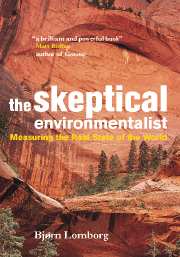Book contents
- Frontmatter
- Contents
- List of figures
- List of tables
- Preface
- Language and measures
- Acknowledgements
- Permissions
- Part I The Litany
- Part II Human welfare
- Part III Can human prosperity continue?
- 8 Are we living on borrowed time?
- 9 Will we have enough food?
- 10 Forests – are we losing them?
- 11 Energy
- 12 Non-energy resources
- 13 Water
- 14 Conclusion to Part III: continued prosperity
- Part IV Pollution: does it undercut human prosperity?
- Part V Tomorrow's problems
- Part VI The Real State of the World
- Notes
- Bibliography
- Index
11 - Energy
Published online by Cambridge University Press: 05 March 2013
- Frontmatter
- Contents
- List of figures
- List of tables
- Preface
- Language and measures
- Acknowledgements
- Permissions
- Part I The Litany
- Part II Human welfare
- Part III Can human prosperity continue?
- 8 Are we living on borrowed time?
- 9 Will we have enough food?
- 10 Forests – are we losing them?
- 11 Energy
- 12 Non-energy resources
- 13 Water
- 14 Conclusion to Part III: continued prosperity
- Part IV Pollution: does it undercut human prosperity?
- Part V Tomorrow's problems
- Part VI The Real State of the World
- Notes
- Bibliography
- Index
Summary
We will soon run out of oil. Again.
As E magazine wrote in July 2000:
Here's the scenario: Sticker shock at the gas pumps, with prices nearly doubling overnight. Long lines at the few stations that are open. Crude cardboard signs reading “out of gas” blocking incoming traffic at the ones that are closed. Huge sales on “full-sized” vehicles. Long waiting lists for econoboxes. Nineteen seventy three? Nineteen seventy nine? How about 2007?
We have heard it all before. And we probably haven't heard it for the last time. But the argument seems not to be based on the facts. There are good reasons to believe that we will not have dramatic price increases, and that we will actually be able to handle our future energy needs.
We are a civilization built on energy
Each and every one of our actions demands energy. Our own body supplies energy equivalent to a 100 watt bulb, but already early in history man attempted to gain control over more energy, primarily through the use of animals and slaves. Not long after we also learned through technical prowess to use nature's energy: sails for ships as well as wind and water mills. Nevertheless, it was only with Watts’ invention of the steam engine in 1769 that it became possible for man to produce large amounts of energy on demand.
- Type
- Chapter
- Information
- The Skeptical EnvironmentalistMeasuring the Real State of the World, pp. 118 - 136Publisher: Cambridge University PressPrint publication year: 2001



